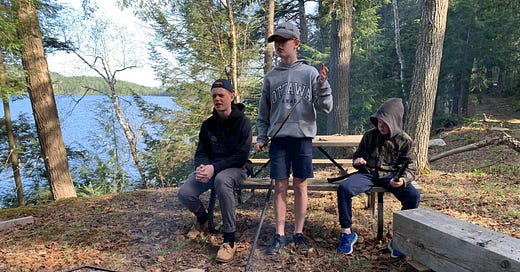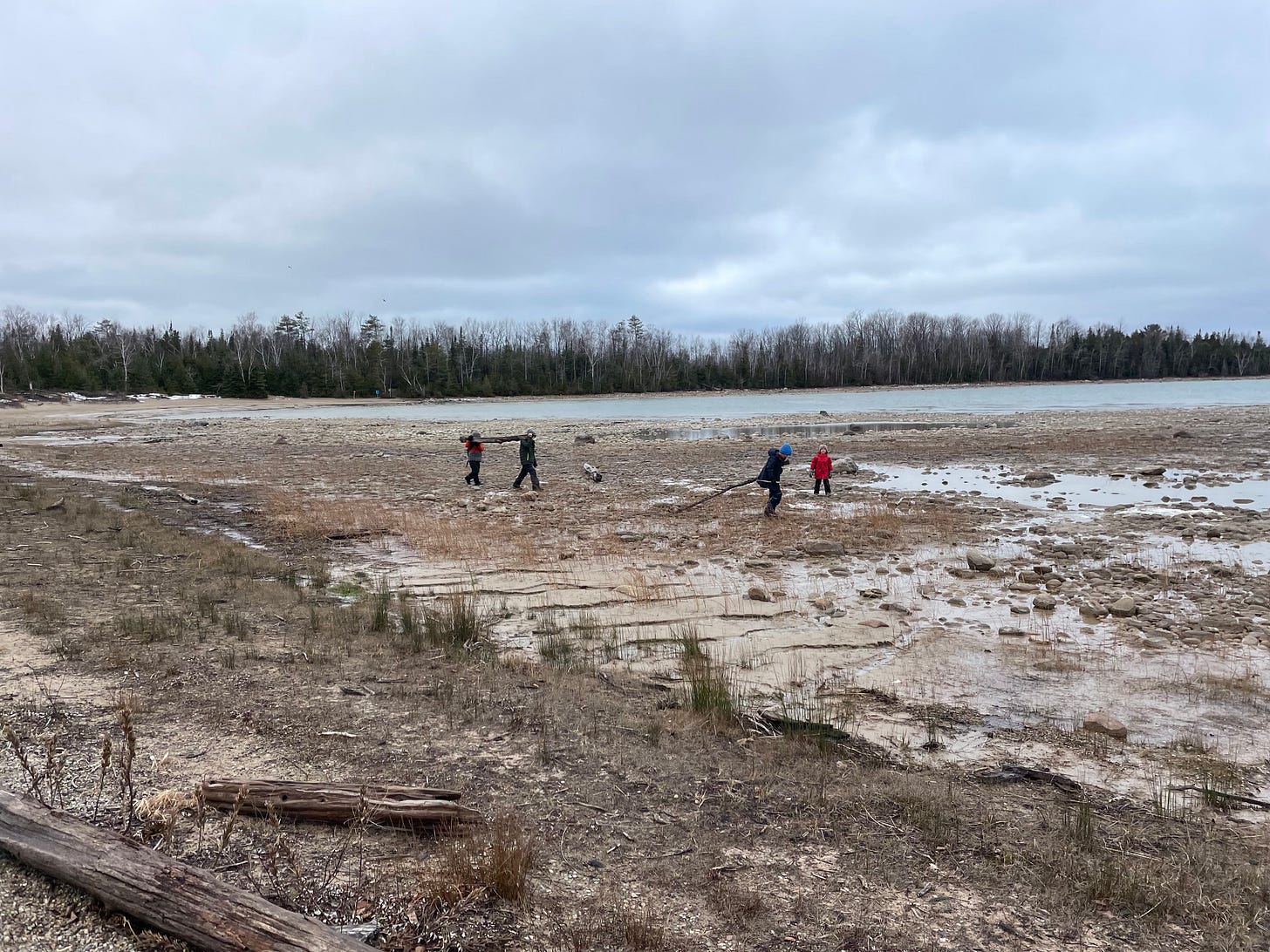On Filling the Void
What should kids do with the extra time that’s left when screens are taken away?
A Note to Readers: If you have read my new book, Childhood Unplugged, would you please consider leaving a customer review on Amazon.com? This helps hugely to boost the book’s profile and reach. Thank you!
For all the talk about needing to get kids off their phones, relatively little is said about what kids should do with their new free time. I think this is because many parents simply do not know. We’ve become so accustomed, as a culture, to handing over devices to entertain children that we sometimes forget what they used to do in pre-screen times. This lack of familiarity, I think, is at the root of many parents’ hesitation to withhold devices at all; they’re afraid of what will happen when forced to confront “the void.”
And, most certainly, a void will open. If you look at the stats for average daily total entertainment screen time from Common Sense Media, it’s 5.5 hours for tweens (ages 8-12) and 8 hours, 40 minutes, for teens (ages 13-18). Please note the entertainment part of that sentence; this is screen time used for “fun”, primarily social media, YouTube, and gaming. So, if you suddenly take that away, kids are left with a huge swath of empty time to do… what?
This is where a parent’s role is critical, not only in enforcing the ongoing digital detox, but in helping guide the child to (re)discover how to play in an offline world. There’s an initial replacement phase, when the devices are taken away and the child is forced to pivot toward other activities that may have to be suggested/demonstrated by the parent, but as those independent play muscles develop, the parent will be able to pull back and let the child figure things out on their own. It’s not unlike other major parenting milestones, like potty training. It can feel grueling in the moment, but the effort pays off down the road.
How to Fill Offline Time

What follows is a general (and far from comprehensive) list of my advice on how to face the proverbial void with optimism, rationality, and confidence.
Reframe it as an opportunity. Getting rid of screen-based entertainment in the home is a chance to create a higher-quality childhood for your kid. They stand to gain greatly by not squandering these fleeting and formative years by zoning out in front of auto-playing inane YouTube videos. They deserve better, and you’re giving them that. Be happy about it!
What can they do? In a word, play. Active play is what used to occupy children’s time in between school and homework and chores and sleep. Evolutionarily, it is what they need to develop optimally and become well-rounded individuals by adulthood. We can (and should) go back to a world in which real play has primacy. Think about how you used to play as a kid and use that a starting point for inspiration.
How can you make them play? You say, “Go play,” and then you let them be! Obviously, this is age-dependent, and younger kids require more supervision. It helps to have siblings, a.k.a. built-in entertainers, or to invite friends over to play. (Counterintuitively, more children make the job easier.) But the key is always to be pulling back as the parent, to be giving the child space and opportunities to get into games independently, without requiring the adult’s participation.
Invest in good toys. Loose-part toys are ideal. These are open-ended things that can be reimagined in endless ways, based on the season, the child’s mood, and who their playmate is. Consider indoor and outdoor things like buckets and shovels, boxes, blocks, sticks, fabric, rope and string, measuring cups, beads, paper tubes, rocks, wood pieces, hammer and nails, paint and paper, etc.
Make your yard interesting. If you expect a kid to play outside, try to make their space appealing. I have spent money on a second-hand trampoline, a new slackline, a treehouse, basketball net, skateboards, pogo sticks, bicycles, sidewalk chalk, and more, as incentives for outdoor play. We made a “mud pit” in a corner of our yard where they can make mix dirt and water to their hearts’ content, after which I rinse them with the garden hose before letting them back in the house. Think of it as a reallocation of funds from upgrading devices and data plans to promoting healthier play.
Use a timer. Sometimes I tell my younger kids, “Go play outside for 45 minutes. I’m setting a timer. You can’t come in before that.” It helps them to commit mentally to a longer chunk of time—and often they don’t come in for much longer.
Employ constructive threats. If my kids grumble about going outside to play, I may pitch an alternative activity that is far less appealing, like folding laundry or cleaning a bathroom. Without fail, they dash outside and end up having fun. Those kinds of “threats” are excellent motivators at the right moment.
Put them to work. Expanding on my last point, kids should be expected to pitch in around the house, and this helps fill the void. Folding and putting away a full load of laundry, baking muffins for the week’s lunches, mowing the lawn, vacuuming, and washing windows are all excellent uses of time with important lasting value. I send my kids on errands around town—to get milk at the corner store, to pick up the mail, to drop off overdue library books. It gets them out of the house and saves me from having to do it.
Sign up for extracurriculars. Offset the pressure of the void by getting your kid involved in local music, sports, theatre, or other programs. Just don’t overdo it, because unscheduled time is important, too. Consider doing activities together; our family goes cross-country skiing most winter weekends.
Get good books. If you want your kid to read, fill their environment with books—but make them good ones! Children’s literature is often so insipid and dull that it’s no wonder kids are disinclined to read. I lean more toward old books that, to quote Erika Christakis in The Importance of Being Little, “can really scare the pants off kids, which, in the right context, is an electrifying stimulus to the imagination.”
My kids love books of Norse and Greek mythology and moralizing fairy tales that feature spicy accounts of getting one’s comeuppance, as well as Calvin & Hobbes comics. Christakis is the only other person I’ve heard mention Bill Peet, whom I consider to be one of the greatest children’s book authors of all time. Do yourself a favor and order his books today.
You don’t have to play with your kids. I recently told a new stepmom that I rarely play with my kids, and she almost fell over in shock. It’s not everyone’s cup of tea, and I just don’t see a parent’s role as automatically having to involve active playtime on top of everything else they do, unless they love it. I am present and accessible to my kids, but I prefer to read a book, cook, work out, rake leaves, or shovel snow while my child plays nearby. I say this because taking away screens should not mean more work for you as the parent; you can expect your child to entertain themselves and not demand even more of your attention.
Boredom is good. An aimless child will eventually find something to do. Boredom is a rich and fertile state that can lead to tremendous creativity, but you have to let them be in order for those seeds to take root.
Put them to bed. Screen time disrupts so much crucial sleep time that taking away devices is a chance to develop much healthier habits. My kids go to bed between 7:30 and 8:30 p.m. every night (they range in age from 8 to 14), and they get 10-11 hours of sleep per night. They’re well rested, I get a break, and we’re all happier.
Lastly, parents should strive to enrich their child’s offline life. Help your child develop interests and do fun things that make them understand that reality is more engaging than virtual reality. They won’t learn this instinctively (especially if they have access to low-friction and instantly gratifying entertainment in the form of a phone or computer) and must be taught. Model the behaviours you want to see in them—prioritizing conversation and eye contact, practical skills, appreciation for nature, reading books, and more.
I hope this list is helpful, and I’d love to hear any of your own suggestions and tactics in the comments below.
You Might Also Like:
It’s the Adults, Not the Kids
I’ve Finally Figured Out When My Kids Can Get Smartphones
Move With Purpose
I recently set up pledges for The Analog Family. If you enjoy my work, please consider making a financial pledge. This newsletter is a labour of love thus far, but it takes a lot of time and energy! Pledges are a wonderful motivator for this work that I consider to be more important than ever. You can also show support by buying my book and leaving an Amazon review!







A friend and I exchange childcare, which works out great for our only children that won't start school until September. This morning my son and his friend played in our 8x12 backspace that in the winter is full of mud, ice, bricks, sticks,plants and toy trucks. The kids had a blast and I got to hang out inside on my own and with my friend when she showed up. I am thinking we will build a little playhouse out there this spring and definitely try growing grapes.
Before they went outside, they made grand messes in the living room and my son's bedroom. That's my big advice-get over the messes. Everyone can clean up later.
I think having loads of paper and a variety of art supplies are helpful too -- and not being insistent that things stay spotlessly clean. Sometimes things, projects, etc, just stay out to confined places to be easily resumed the next day.
I find the unplugged life is just messier, but there's a beauty in that.
Ongoing play (like my kids' massive blanket for they built on a snowy week that became their Tolkien-inspired Hobbit hole complete with library and twinkling lights) requires me to relax -- the tradeoffs being it's a little louder and there are more antics and things to tend to later -- but my kids are having an embodied childhood and I wouldn't trade that for anything.
I hear all the time from other parents who "just can't deal" -- with the noise, the mess, the relational conflict that arises from play (especially in middle childhood) -- and don't foster device-free play... and then wonder at the complexities in their children's behavior EXACERBATED by being so plugged in.